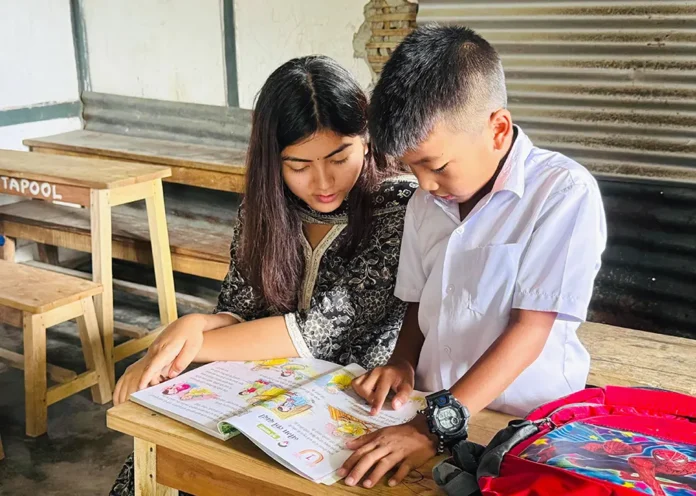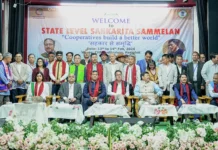The young district of Keyi Panyor is undergoing a significant and visible transformation, spearheaded by Deputy Commissioner Shweta Nagarkoti.
This change is guided by ‘six core goals’ for 2025, which aim to establish open, accountable, and practical governance built on three simple principles: listening to people, acting on facts, and continuously improving through feedback. A vital catalyst for this new energy is the Deputy Commissioner Fellowship Programme (DCF), launched in July 2025. This initiative boldly invited bright, young professionals to collaborate directly with the district administration.
After a rigorous selection process, culminating in a viva voce for 14 shortlisted candidates, three exceptional fellows were chosen, marking one of the first such fellowship programmes in the state. These inaugural fellows are Likha Caral, a doctoral researcher from New Delhi, Likha Bai, a PhD scholar at Rajiv Gandhi University, and Toko Yapung, an MA graduate in psychology. They are the backbone for planning, fieldwork, data analysis, and reporting across critical sectors like education, health, environment, and rural development.
Education swiftly became the most critical priority for Keyi Panyor. Initial research by the Deputy Commissioner Fellowship (DCF) team quickly identified the roots of the crisis in the schools themselves: recurring issues of widespread teacher absenteeism; deep flaws in accountability structures;and inconsistent classroom management.
Recognizing that the problem lay with staff and systems rather than the students, the DC and her team moved beyond mere observation to decisive action. In response, Nagarkoti, in collaboration with the DDSE, launched a ‘focused cluster-wide school inspection and accountability drive’ from 14 to 18July. The inspections confirmed administrative failures, including inflated enrolment figures and teachers absent without approved leave.
The response was immediate and resolute: thirty-five teachers received show cause notices, and several headmasters were replaced to inject vital new leadership. This firm action served to enforce accountability and signal a non-negotiable shift in administrative expectations. Crucially, the drive also provided immediate, practical solutions on the ground. Infrastructure fixes were initiated without delay, including urgent ceiling repairs, electricity, beds and tables at NSCBAV Lichlith, and hostel window repairs at the Government Residential School, Kugi Tago. Essentials were swiftly provided; the DC and the DCF team arranged and installed water filters at GSS Pitapool for safe drinking water. Furthermore, the administration strategically addressed resource allocation by shuffling and transferring teachers to meet staffing and subject needs in underserved schools, and also successfully resolved a widespread textbook shortage in coordination with the education department, ensuring that many students received their required materials quickly.
The DC met with the cluster CDPO to mobilize anganwadi workers to support nearby schools. To improve the quality of instruction, the DCF developed class-wise academic session plans aligned with the official syllabus and school calendar. These plans serve as a structured roadmap, helping teachers finish lessons on schedule, prepare students effectively for tests, and maintain reliable academic routines. This initiative ensures clarity for everyone involved, establishing clear expectations on what must be taught, by when, and how progress will be monitored.
Alongside these administrative reforms, creative interventions the DC also observed that many students lacked clarity about their future goals, while teachers had little time for personal mentoring. To bridge this gap, she launched the ‘vision board initiative’ – a creative exercise encouraging every classroom to display students’ names alongside their dream careers. Using simple materials like chart paper or plywood, schools transformed classroom walls into spaces of aspiration and self-belief. The initiative helped teachers better understand their students’ ambitions while motivating children to think purposefully about their futures. The response was overwhelming as out of 26 schools visited, 19 implemented the vision boards with enthusiasm and creativity. Teachers noticed improved participation and curiosity among students, while parents appreciated seeing their children’s aspirations proudly displayed. Alongside this, Nagarkoti also introduced the ‘wall of fame’ to recognise outstanding achievements in academics, sports, and extracurricular activities. By celebrating both dreams and effort, these initiatives turned classroom walls into symbols of motivation, reminding every child in Keyi Panyor that their journey towards success begins with believing in themselves.
Citizen participation isn’t just a goal in Keyi Panyor; it’s the foundation of public life. The administration has made sure that everyone has a say by launching ‘Voice of Keyi Panyor’, a platform for open feedback that allows residents’ opinions to directly shape policy. This spirit of shared responsibility fueled the ‘Clean and Green Keyi Panyor Mission’. To tackle waste head-on, the district executed the simple but effective ‘Har Ghar Se Ek Dustbin’ campaign, distributing one hundred artistically designed dustbins along the main Pitapool to Joram road. This action visibly empowered every single household to take ownership of cleanliness in their immediate environment.
Furthermore, the district ensured that its most important messages were hard to miss. Along the same road, strategically placed digital art boards now display short, impactful public service announcements. These boards focus on critical themes like drug awareness, cleanliness, and cultural preservation, and are communicated in both English and the local Nyishi dialect for maximum clarity. By pairing practical tools (dustbins) with localized public information (digital boards), Keyi Panyor has successfully woven governance into the daily actions and civic pride of its people
The community played an essential role in creating the district’s new look. They did this through the ‘Design My Keyi Panyor’ campaign, which was essentially a public competition called ‘Design My Logo’. Residents were invited to submit their ideas for a new official emblem that would be unique and truly represent Keyi Panyor. This effort clearly showed the administration’s strong commitment to public participation. The competition led to a winning design, which has been officially adopted and now serves as the official logo of Keyi Panyor. This powerful new emblem is a daily reminder that the district’s governance is shared and rooted in local pride.
To ensure that administrative dialogue is continuous, and to keep the local government constantly connected and listening, the DCF created ‘DC Samvad’ (DC Dialogue), an essential monthly public meeting. This forum directly bridges the gap between citizens and officials, with the main goal of making sure the people’s voices actually guide the government’s daily work. DC Samvad is built for action and direct talk: citizens and officials meet in person with the deputy commissioner, bypassing slow bureaucracy. In these sessions, people discuss problems, share ideas, and all parties agree on clear solutions and next steps. Crucially, every issue leaves the room with a defined responsibility and timeline, ensuring complaints don’t get lost. This simple initiative has changed how the district runs, guaranteeing active listening and faster follow-up by making sure someone is clearly responsible for every action.
Looking ahead, Keyi Panyor is focused on turning its abundant natural beauty into a serene landscape. The district plans to develop eco-friendly trekking routes, camping sites, and cultural circuits. These projects will showcase the region’s heritage and directly create employment opportunities for local residents. At the same time, the administration is deeply committed to its youths, scheduling important programmes like wellness drives, mental health awareness campaigns, and sports activities. These efforts are all aimed at improving the health and boosting the confidence of young people across the district.
Under the strong leadership of Nagarkoti, and with help from the DCF, Keyi Panyor is successfully building a stable government that focuses on its people. The six core goals are no longer just rules; they are used every single day. This change means the administration follows a clear plan: it is strict about accountability (making sure everyone does their job), quick to solve problems, always ready to hear new ideas, and respectful to everyone.
This new, consistent way of governing guarantees steady progress for the whole district. (DIPR)



